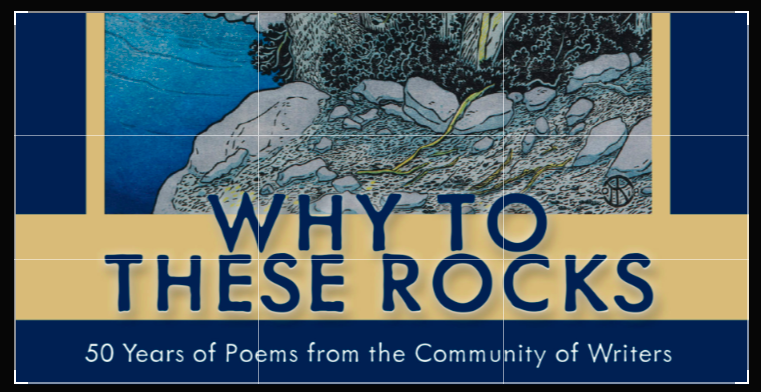I love that expression “a day late and a dollar early” although I’m not quite sure what it means. In any case, I’m a day late with today’s Monday poem because I’ve been helping with the book launch for the Community of Writers 50th Anniversary poetry anthology, Why to These Rocks.
That event will be a virtual reading on March 11, with Forrest Gander, Robert Hass, Brenda Hillman, Greg Pardlo, Evie Shockley and others, each reading a poem from the anthology. I’ll be emcee. It will be live on March 11 at 6:30 pm and you can register here. I think it will be an extraordinary event.

In any case, I am including a poem here that didn’t make it into the anthology, but one that I think captures some of the spirit of the Community:
Temblago
When Galway gets up to pee in the night he finds Temblago,
an imaginary place somewhere in France
that doesn’t exist anymore, a small country, rocky,
whose people, also called Temblago, are so
tenacious, the word has come to mean holding fast,
the way a piton clings to rock. When I get up,
I find one more mosquito bite in the soft indentation
of the inner arm. David says that insects are fantastic
that their name, “in sections” derives from how they are made,
many tiny sections, how even the tiniest insect, even a mite
has the same organs we do: a mouth, an anus,
reproductive organs, a digestive tract. We should think
about that instead of swatting it. He shows us an antlion,
a mysterious, armadillo-like bug with the miniature claws
of a dust-colored lobster, how it digs holes in the friable floor
of the forest, the grains at the exact angle of repose,
so when an ant falls in, it can’t scramble out; its frantic
legs alert the antlion who grabs it and devours it.
He demonstrates, dropping a carpenter ant into a thumb-sized depression.
We see the antlion’s claws grab hold. David scoops up
the tiny antlion and it’s prey, lets the ant go,
and holds the antlion in his palm, before dropping it
back in its hole. Antlions have a hard time, he says,
their metabolism is slow and very few ants
fall into their holes. They reproduce painfully slowly,
they turn have their chitonous into gossamer.
So I think about being nicer to insects, but still
I swatted the one that landed on me in the hammock,
just when my eyes were beginning to close, because
it was starting to suck my blood and that really seemed
like an act of insect aggression. Brenda says
she’s been trying to pin Bob down
about the wildflower walk, and I think
what that must be like, trying to pin Bob down, Continue reading “Poem and more poetry” →

 This excerpt is from Brenda Hillman’s most recent book, Extra Hidden Life Among the Days. I had a hard time with it at first, but took a workshop that helped me understand the poems are about struggling to come to terms with the ecological disasters of the current moment, trying to find a way to make poetry in the midst of political, social, and natural disaster. Here’s a brief section from the book:
This excerpt is from Brenda Hillman’s most recent book, Extra Hidden Life Among the Days. I had a hard time with it at first, but took a workshop that helped me understand the poems are about struggling to come to terms with the ecological disasters of the current moment, trying to find a way to make poetry in the midst of political, social, and natural disaster. Here’s a brief section from the book:
